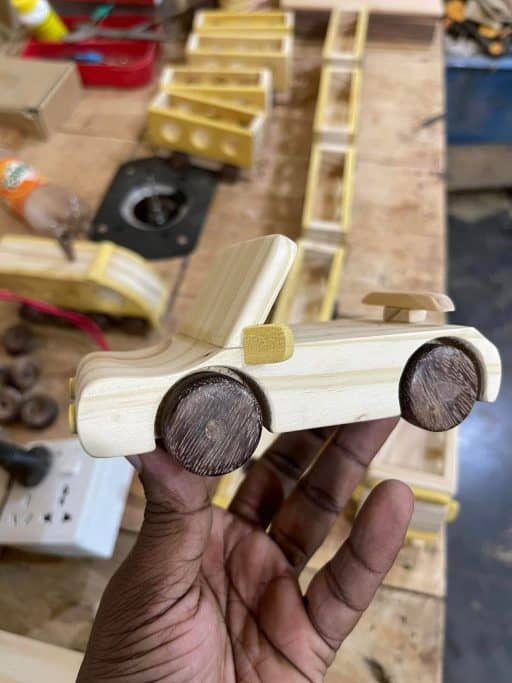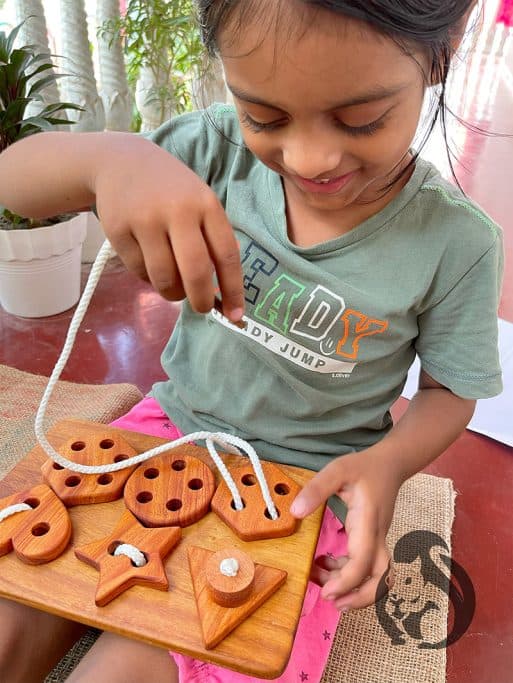A business in South Asia makes safe and high quality wooden toys to bless children and families.
By James (name changed)

I grew up in South Asia, but when I returned there after college some twenty years ago to help serve the church, I faced some surprises.
One of them was that virtually all ministry funding was from the West, not from local church giving. There were (and are) many foreign-funded workers, but not a single full-time locally-funded worker that I had heard of. Well-intended Western generosity had stifled local giving.
Meanwhile, many youth in the youth group I volunteered with were either pursuing get-rich-quick schemes, avoiding menial work and hoping for desk jobs, or doing work that didn’t really benefit society.
I quickly realized the importance of teaching Ephesians 4:28: “Anyone who has been stealing must steal no longer, but must work, doing something useful with their own hands, that they may have something to share with those in need” (NIV). I wanted to see these young people finding ways to bless their communities with quality work so they could provide jobs and give financially to the Lord’s work.
Now, fifteen years later, I’m overjoyed to see Anowar (name changed) living this out.
The idea for Squirrel Toys started when Anowar’s uncle was forced out of his ancestral Muslim village because he now followed Jesus. A carpenter by trade, his uncle now had no work, and Anowar was wondering how he could help him make quality, marketable products. Meanwhile, Anowar had two young daughters of his own.
As a creative designer, he had learned the importance of creativity in the workplace and wanted his kids to develop creativity. However, the local education system doesn’t develop creativity, and the local toy industry is dominated with cheap plastic junk that beeps and flashes but doesn’t have any educational or developmental value for children.
He started researching Montessori-style toys and creating prototypes with his uncle, testing them with his daughters. He researched thoroughly about safety–what types of wood finishes are truly non-toxic and child-safe? He ended up choosing to avoid paint finishes since it’s hard to evaluate its toxicity. Instead, he uses various types of local woods to add variety in tone.


After two or three years of prototyping, he was ready to launch the company. Anowar was surprised by the demand for his toys after the business launched. There was a backlog on orders, far more than he could supply. Soon he had five employees working from their family home.
He realized that he needed business advice, and at this point I connected him with the Business for Transformation (B4T) catalyst group that supports entrepreneurs who live out their faith daily through business. Through a series of video calls, B4T mentors encouraged Anowar as he developed a business plan and identified priorities in management. They also gave him a tailor-made loan that could help his business grow at a sustainable rate.
Further projections are needed in order to chart out longer-term growth, and the B4T group continues to support Anowar through mentoring, analysis of the health of the business and loan structures that give him access to funds as needed without the crushing burden of long-term interest.
Anowar was surprised by the demand for his toys. There was soon a backlog on orders, far more than he could supply.
Recently Anowar has quit his job as a video editor to focus more on this business, his family and faith. He’s experiencing a shift in his faith. As he describes it, for many years he was far too preoccupied with establishing financial stability: money had become his god. He has now discovered experiencing Jesus’ presence through meditating on scripture and experiencing God’s love directly.
“After 12 years of marriage I seem to be falling in love with my wife again, and I’m building many new experiences with my girls as well. Perhaps one day I might have a lot of wealth but then my daughters won’t want to play with me. Fathers hurt themselves when they focus on building their future while destroying the present,” Anowar wrote. “I’m realizing that the future really just comes to us as the present. I urge you fathers, your time is your kids’ most precious toy. Let’s all invest quality time with our wives and children.”
Currently, Squirrel Toys has 29 products: puzzles, stacking rings, lacing toys, cars, trains, marble tracks, teethers, and blocks. For marketing, he uses Facebook and WhatsApp, sending products by courier from his home. Sometimes he visits children’s fairs to promote his products, but mainly his marketing is done by word of mouth and quality videos on his Facebook page.
He has many happy customers who leave positive reviews and recommendations. One customer wrote, “The toys are very beautiful and quality. Children have no problem playing. The funny thing is that no matter how many new toys are given, they will take this wooden toy.” Others noted how the toy market in their country is flooded with toxic colored toys and plastics that can be harmful developmentally, appreciating the option to buy good and healthy alternatives.
Anowar doesn’t have huge dreams for the business. He wants to live in the present and see how he can support his family and his employees through this business, but also give time to his family and his relationship with God. He’s happy to see how new products are touching customers and making them find safe, healthy ways to play together.
James T. is a graphic designer serving in South Asia, where he disciples youth, develops leaders, and works for church multiplication among Muslim-background believers.
